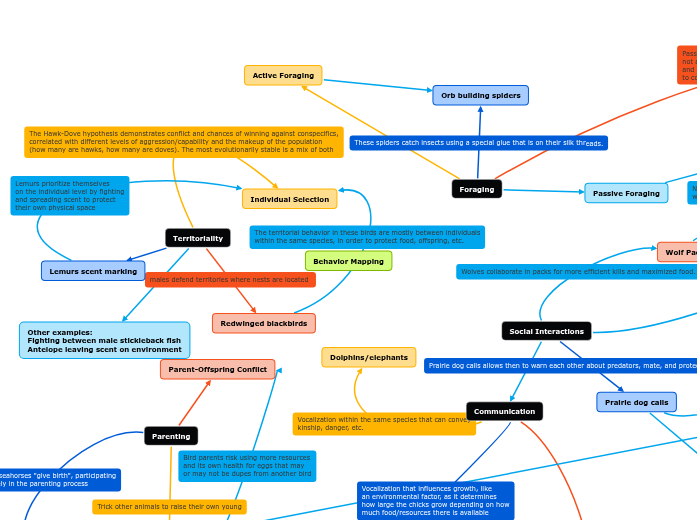The Hawk-Dove hypothesis demonstrates conflict and chances of winning against conspecifics,
correlated with different levels of aggression/capability and the makeup of the population
(how many are hawks, how many are doves). The most evolutionarily stable is a mix of both
males defend territories where nests are located
Passive foraging is when the predator does
not active seek out its source of food. Whales open their mouths
and filter out food from the water. Spiders wait for insects
to come to their webs to get trapped
These spiders catch insects using a special glue that is on their silk threads.
Kin selection claims that animals are more likely to behave altruistically towards their relatives than towards unrelated members of their species
Prairie dog calls allows then to warn each other about predators, mate, and protect their territory.
Vocalization within the same species that can convey
kinship, danger, etc.
Nonverbal aggressive communication method
Vocalization that influences growth, like
an environmental factor, as it determines
how large the chicks grow depending on how
much food/resources there is available
Females prefer smaller sized
offspring and males prefer larger
sized, respectively for resource
conservation and survivability
Trick other animals to raise their own young
Male seahorses "give birth", participating
actively in the parenting process
The territorial behavior in these birds are mostly between individuals
within the same species, in order to protect food, offspring, etc.
Lemurs prioritize themselves
on the individual level by fighting
and spreading scent to protect
their own physical space
kin selection occurs when an animal involves in a sacrificial behavior for others; thus, there is an interaction
Bird parents risk using more resources
and its own health for eggs that may
or may not be dupes from another bird
A potential reason for females deciding mates through
their dances/plumage is the "sexy son hypothesis" where
those factors are deemed to determine whether offspring
may have reproductive success
Prairie dogs are more likely to call out to warn of predators
when their kin are in the vicinity-- if they themselves cannot
pass down genes, they are instead preserved through their kin
Especially in sexually dimorphic species like birds of
paradise (pair bonding), mates' relationships are
competitive in formation and "filter" what genes are
passed down.
Wolves collaborate in packs for more efficient kills and maximized food.
Not completely reciprocal altruism, but wolf packs are an example of teamwork
when hunting prey to benefit the entire group (eg strength in numbers)
Not so much conflict as it is selection in the mating process
